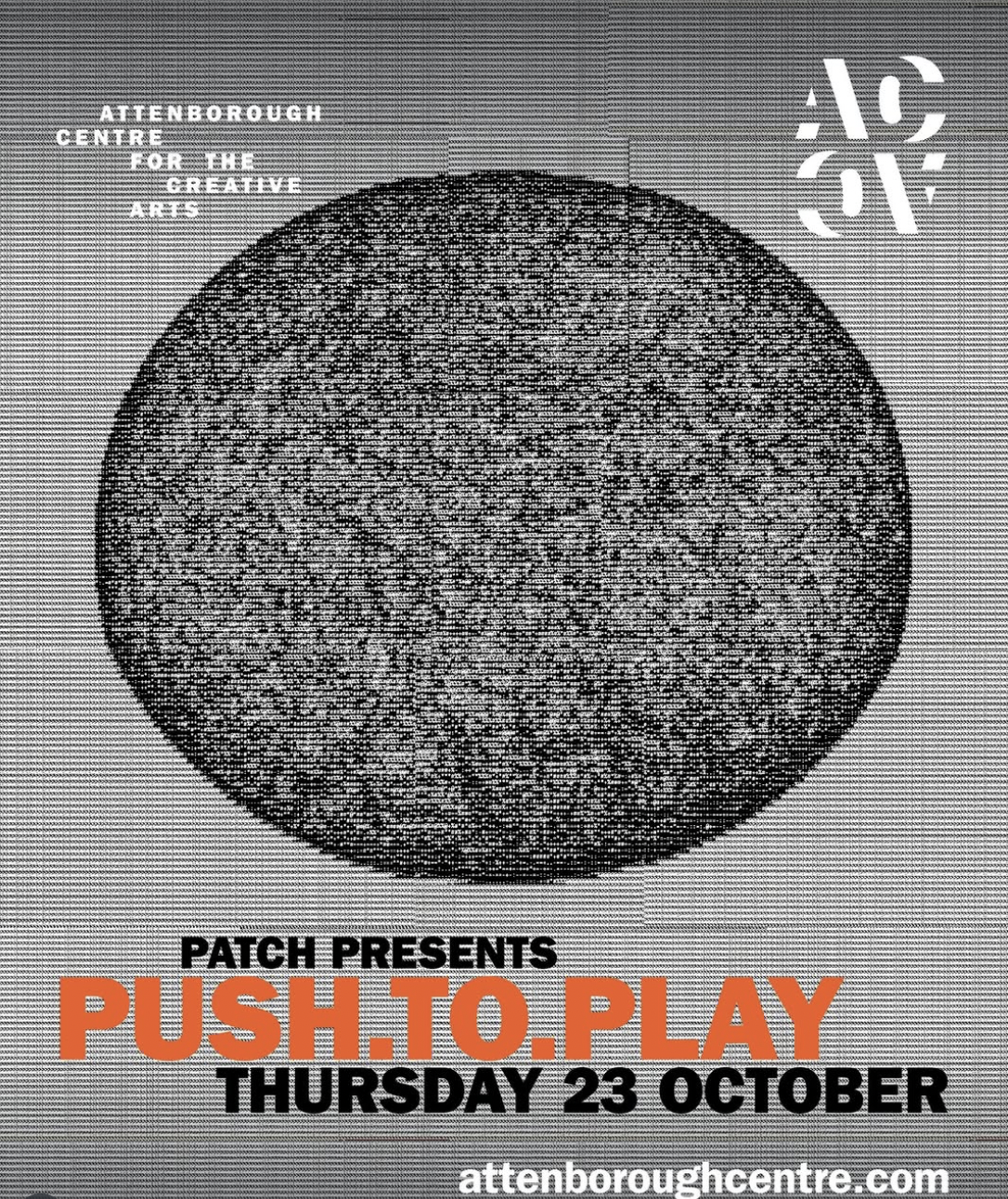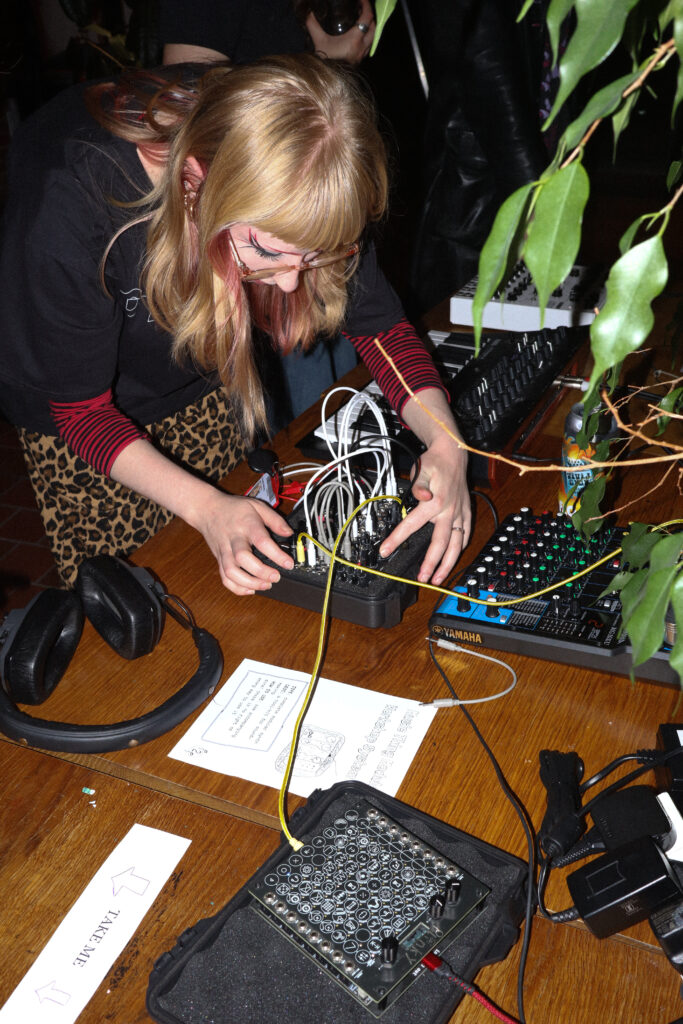
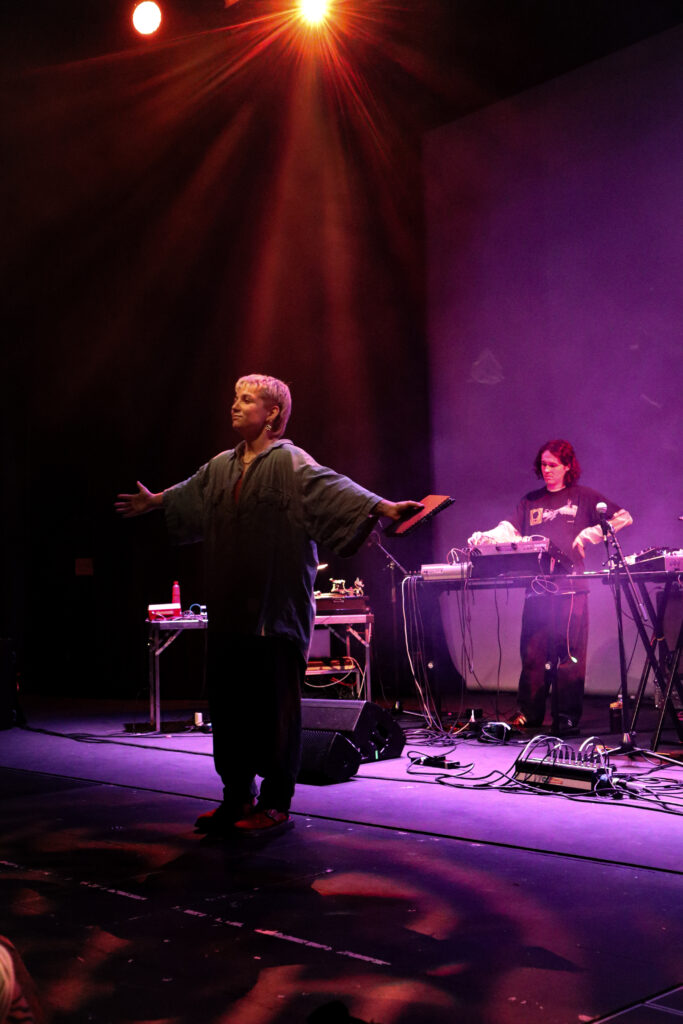
Patch is a growing collective currently made up of Nonny Corbett, Georgina, Emily-Rose Chantrill-Cheyette and Louis Myatt. Their debut event, push.to.play, debuted at the Attenborough Centre for Creative Arts on 23rd October.
The evening included a performance by Robinson’s Village, which is the project of James Burn who uses tape loops and modular synths to create ambient sound. Furrowed (Dylan Beattie) was joined by Cederick Knox to improvise with a live-cut record and a grand piano, mixing the experimental with more classical instrumentation. The final act was Noise Peddler- a duo composed of Danny Bright and Lee Westwood who use no-input pedalboards. There were also more interactive elements, including Emma Bean’s ‘Concepts of a Plan’, and in the café bar, the audience was encouraged to play with some of the gear featured in the show.
I spoke to Nonny, Georgina, and Rose to find out more about Patch.
What is Patch?
Georgina: Patch is a group of people who are dedicated to putting on experimental shows exploring either audio or visuals. We are really interested in making sure experimental music and visuals are open to everyone. That everyone is able to attend shows, feel comfortable attending shows, make music and meet like-minded people. That is what it is to me.
Rose: The main thing is overcoming the barrier that is in a lot of the art scenes, where it is like small circles of people that already know stuff. It’s welcoming people to it in the least intimidating way possible. Just making it accessible so that people don’t feel like they need an established practice, but rather they are welcome to explore things at whatever capacity and just play with things.
Georgina: Yeah, play was a big element.
Nonny: Yeah, exactly. I feel like we want to expand and keep doing stuff, but this showcase is the first one we are going to be doing. It’s a growing group of people who want to meet like-minded people.
How did Patch come to exist?
Georgina: Louis had put on a showcase at The Rose Hill, so I was keen to reach out to Louis first to see if we could work together on it. Then we sort of expanded, I thought of Nonny ‘cause I knew that Nonny was into the idea of putting on a show at ACCA. Then Rose put up a poster.
Rose: I did! I put up an interest wanted poster. I was getting just general interest in creative tech stuff ‘cause I wanted to host my own event or make a showcase or make a little collective or something, so I just put posters around campus. Then both Georgie and Nonny saw it, and we just ended up finding each other.
Georgina: We were kind of scared to use the word collective as we didn’t know if it sounded too pretentious, so we decided on Patch because it was kind of a good metaphor for what we were doing, patching people together to create this show. We wanted to include something related to modular, so patch like patch cables.
Can you explain why you are interested in curiosity and play?
Rose: Well, firstly, for me, every kind of creative thing I have done is self-taught. It is about navigating it myself, literally messing about with stuff; formal education in stuff like this is so rigid, and it shouldn’t be about being examined. It should be about having a feel for things, and I think it can get so intimidating. I love the idea that people can just play. It’s not even childish, but it does bring in this type of childhood wonder; there’s no pressure. It’s just like pressing some buttons, twisting some knobs and seeing what’s happening.
Georgina: It’s validating that we talk of play in such a way because I’ve always felt that I have to know everything about something to join in on a conversation or talk to someone who’s interested in modular or creative tech. With our emphasis on play, we don’t need to be an expert; we are just curious. That’s what makes things interesting to us is just the curiosity aspect. Play is important because you can’t be an expert in everything.
How did the event push.to.play come about?
Georgina: Well, I work at the café, and whenever I organise the bar for the shows, I have to take into account the demographic of people who are going to attend the shows. In becoming an expert on the ACCA demographic, I was disappointed. It’s a lot of the same group, it’s a lot of older white men that come to these shows, and that is fine, ‘cause lots of what ACCA puts on is music from their age. So fair enough that they come, but for such an amazing venue at a university campus where there are all sorts of people around who would feel inspired by the shows they put on, I was kind of disappointed catering to the same demographic every time.
I struck a friendship with the programmer Laura, who is absolutely amazing, and we started talking about ways of making the space feel more welcoming to the people around it, the University of Sussex community, and we thought this show would be a good idea. This show is only for people who are associated with the University of Sussex, alumni, staff and students. This is what we are doing for our first show; we are not always going to be based around the University of Sussex. We want to show that Sussex does great things with experimental music and that this is a venue you can trust. We wanted to increase the relationship between ACCA and the students around it.
Rose: Especially as Brighton Uni gets the rep for all the creative stuff, and it’s like we do cool stuff too!
Georgina: We do amazing stuff! Putting on this show and meeting so many Sussex musicians, we are killing it, we are killing it in the experimental sense as well, like it’s not just boring indie here. It doesn’t have to be boring indie here; we’ve got so much stuff going on that’s exciting and contributing to the future sound and not the stagnant Brighton scene.
Do you find music now quite stagnant and boring? What’s your opinion on that?
Nonny: I don’t find it stagnant, really, at the moment. In a sense, the scene in Brighton at the forefront is a bit stagnant. It’s always the things that are at the forefront that are a little bit stagnant, but then there’s stuff under that isn’t, and that’s what we are trying to do as well.
Georgina: Yeah, push it forward.
Why is the event called push.to.play?
Rose: We made a list of words that sort of related to music stuff, and we made a little list. We were doing some configuring, and nothing was like ‘Yeah, this makes me excited, this makes me want to go to this event.’ The idea of modular synths and music gear like buttons, and the idea of interacting with that. It was like Oh yes, push buttons and what’s been coming up a lot, play, play is really important. This sounds nice. Let’s put some full stops in between so it looks cool, and then that happened.
If someone wants to get into experimental music, how would you advise them to do it?
Rose: Going to our event!
Georgina: I was going to say, this is going to be a really good basis for that! You will meet like-minded people who can advise you, and you can explore your curiosities with them. You can be inspired by the excellent performers we have, and you can have a little play on some of the gear that is hopefully going to be quite accessible. I mean, that’s what we are going for, accessibility with the gear that we choose, so yeah, come to our show.
Rose: Otherwise, to me, it sort of depends on what’s available to you because I saved up and bought a cheap synthesiser and pressed the buttons and figured it out. That’s one way of doing it, but that’s also not affordable to everyone, and that’s why there needs to be more events like ours. There needs to be spaces that allow people to use the stuff without having to commit to a big purchase. More spaces where it’s freely available. The uni gate-keeps its gear; if you don’t study a production course, they need to open it up a bit. There are a couple of things in Brighton, but not that much, not as much as there should be.
Another article you may enjoy: https://thebadgeronline.com/2025/10/from-the-pyre-the-last-dinner-party-album-review/
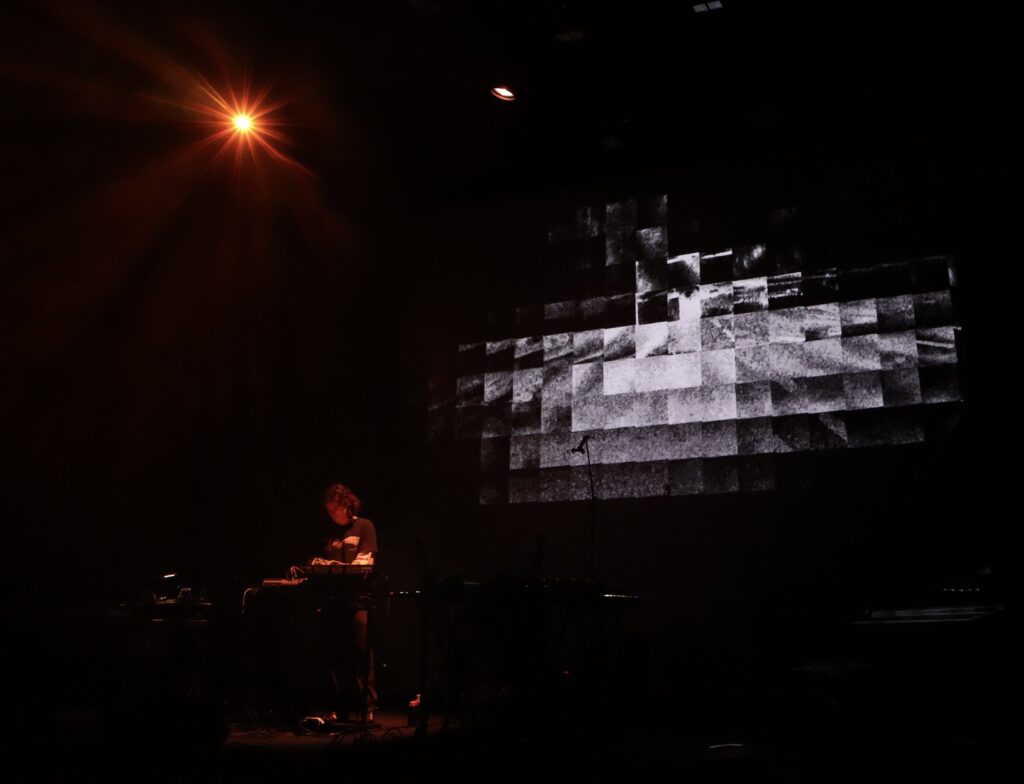
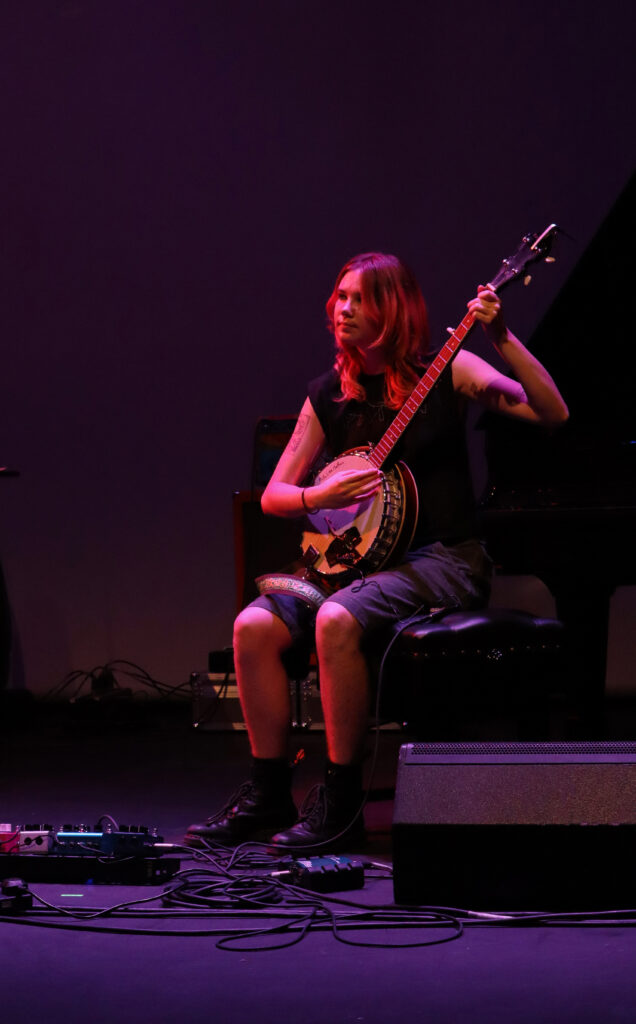
Author
-
Pluto Williams is the Music Editor at The Badger. He leads the section’s coverage of new releases, live performances, and industry trends, combining careful editing with his own insightful writing. Pluto aims to make the Music section a space where student voices can share fresh perspectives on the sounds shaping today’s culture.
View all posts

